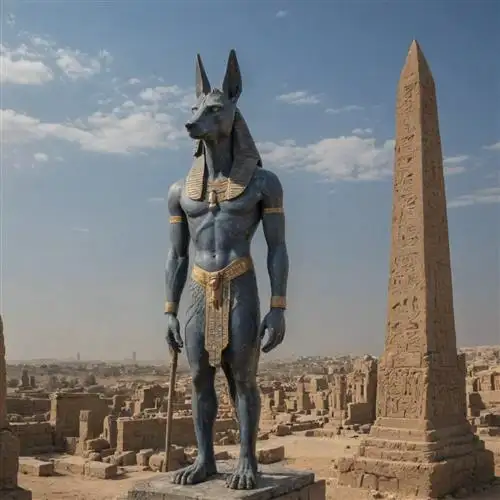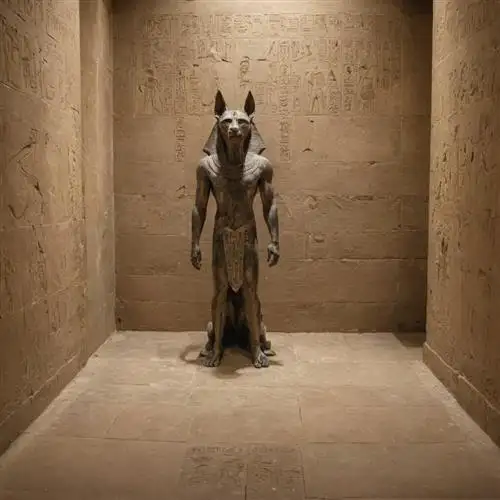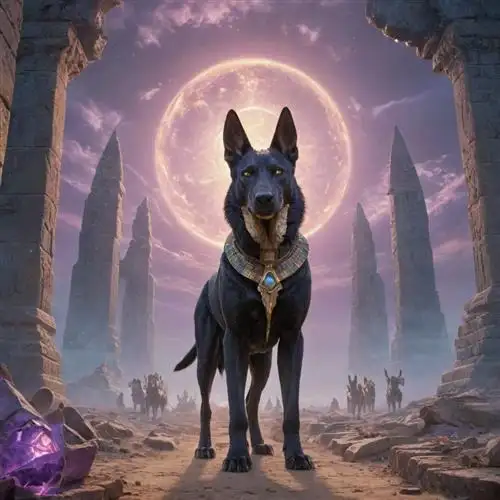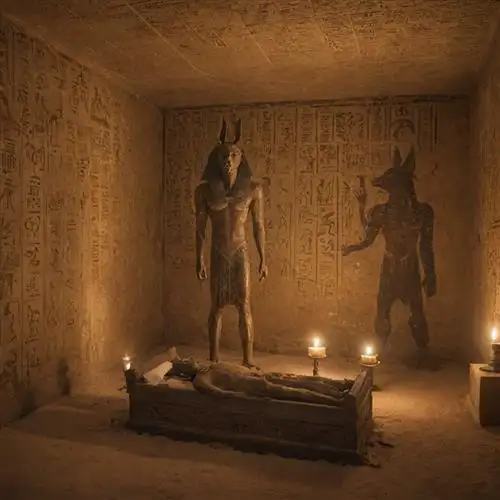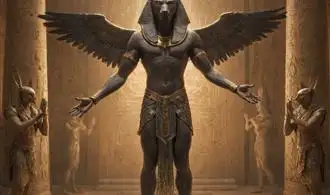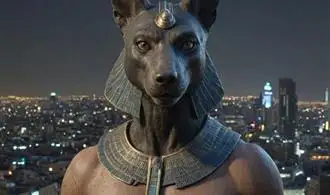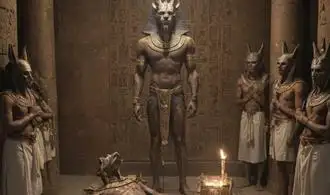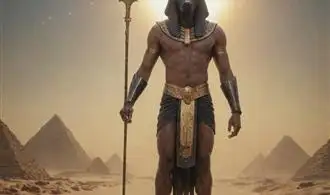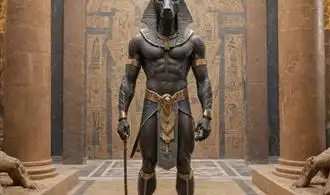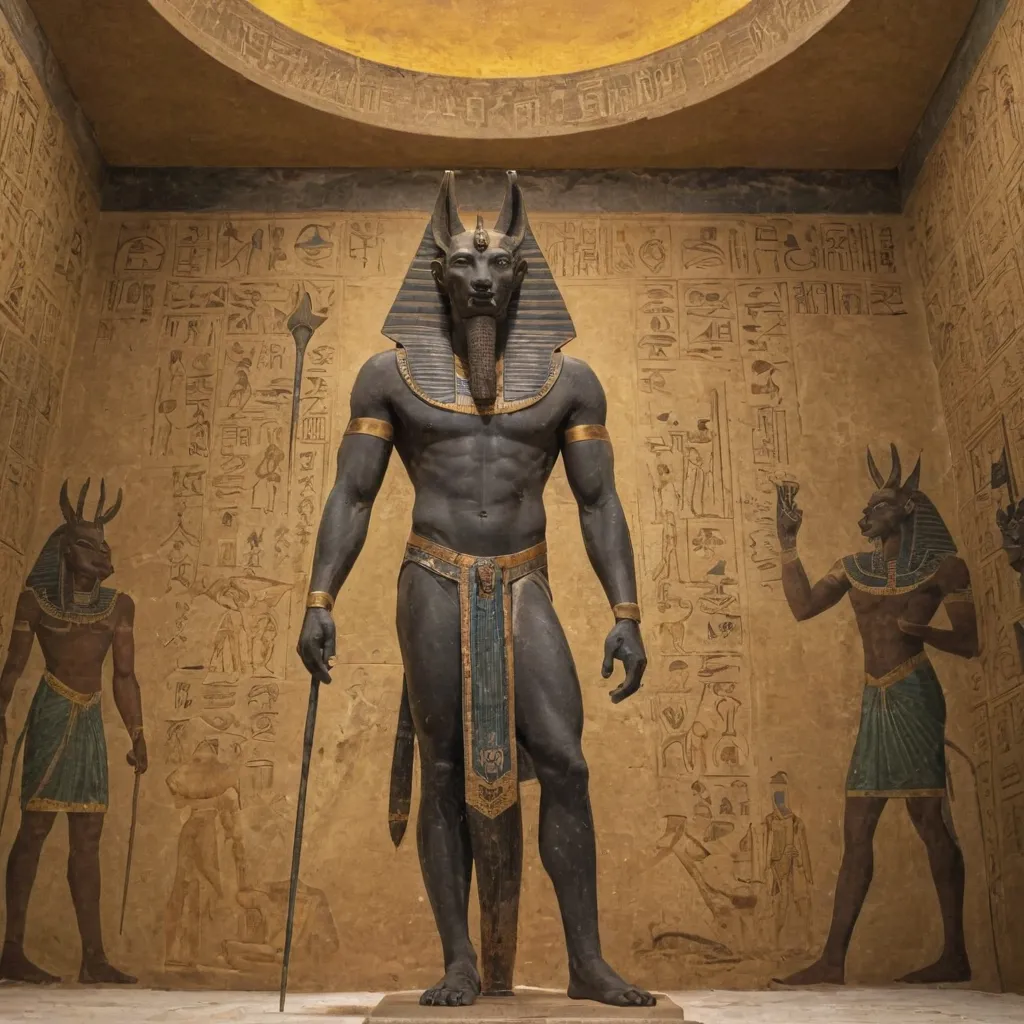
Anubis The Guardian of the Dead
Anubis, the enigmatic jackal-headed deity, has long been revered as the guardian of the dead in ancient Egyptian mythology. As the gatekeeper to the afterlife, Anubis played a crucial role in the journey of the deceased, ensuring their safe passage into the realm of the hereafter. His unwavering presence and vigilance have made him a figure of great significance in the complex tapestry of Egyptian religious beliefs.
At the heart of Anubis' role as the guardian of the dead lies his responsibility for the mummification process. As the deity associated with embalming and the preparation of the deceased for their eternal rest, Anubis oversaw the intricate rituals and techniques that preserved the physical form, allowing the soul to continue its journey into the afterlife. This sacred duty was not merely a practical matter but a profound spiritual act, ensuring the deceased's successful transition to the next stage of existence.
Beyond his role in the mummification process, Anubis was also responsible for guiding the dead through the treacherous terrain of the underworld. In the afterlife, the deceased would face a series of challenges and judgments, and Anubis, with his keen senses and unwavering vigilance, would serve as their protector and advocate. He would weigh the heart of the deceased against the feather of truth, determining the worthiness of the individual and their eligibility for eternal bliss in the realm of the gods.
Anubis' importance as the guardian of the dead was further emphasized by his presence in the funerary rites and ceremonies of ancient Egypt. His image, often depicted as a jackal or a man with a jackal head, would adorn the sarcophagi, coffins, and funerary masks of the deceased, serving as a symbolic guardian and protector during the final journey. The invocation of Anubis' name and the placement of his effigy were integral to the belief that the deceased would receive his divine guidance and protection in the afterlife.
Anubis Presides Over the Weighing of the Heart
Anubis, the ancient Egyptian god with the head of a jackal, presides over the sacred ritual of the Weighing of the Heart. This solemn ceremony, a crucial step in the journey of the deceased, determines whether the individual's soul is worthy of eternal life in the afterlife. Anubis, as the gatekeeper to the underworld, meticulously oversees this pivotal moment, ensuring the scales of justice are balanced with utmost precision.
The Weighing of the Heart is a symbolic representation of the deceased's moral character and deeds during their earthly existence. Anubis, in his role as the "Opener of the Ways," guides the soul through this process, placing the heart of the deceased on one side of the scales, while the feather of Ma'at, the goddess of truth and justice, rests on the other. The heart must be found to be in perfect equilibrium with the feather, signifying the individual's adherence to the principles of Ma'at – righteousness, truth, and balance.
Should the heart be deemed unworthy, the devouring beast, Ammit, a composite creature with the head of a crocodile, the body of a lion, and the hindquarters of a hippopotamus, stands ready to consume the soul, condemning it to eternal oblivion. Anubis, with his keen eyes and unwavering vigilance, ensures the sanctity of this ritual, upholding the cosmic order and the divine mandate of the gods.
The significance of Anubis's role in the Weighing of the Heart cannot be overstated. As the guardian of the necropolis and the protector of the deceased, Anubis is entrusted with the sacred duty of guiding the soul through the treacherous journey of the afterlife. His presence at this critical juncture serves as a reminder of the importance of living a virtuous life, for the fate of one's eternal existence rests upon the outcome of this divine judgment.
Anubis Guides the Souls to the Afterlife
Anubis, the enigmatic Jackal-headed god of ancient Egyptian mythology, has long been revered as the guardian of the dead and the guide of souls to the afterlife. As one of the most prominent deities in the Egyptian pantheon, Anubis's role in the intricate rituals and beliefs surrounding the afterlife is a crucial aspect of understanding the profound spirituality of this ancient civilization.
At the heart of Anubis's responsibilities lies the sacred duty of shepherding the deceased through the perilous journey of the afterlife. Upon the moment of death, it is Anubis who stands vigilant, ready to receive the soul and usher it into the realm of the dead. With his keen senses and unwavering dedication, Anubis ensures that the departed are properly prepared for their final destination, guiding them through the trials and tribulations that await them in the afterlife.
Central to Anubis's role is the act of mummification, a meticulous process that was essential in preserving the physical body for the soul's eventual return. As the patron of this sacred ritual, Anubis oversaw the delicate procedures, ensuring that the deceased were treated with the utmost care and respect. This reverence for the physical form was a testament to the Egyptians' belief in the inseparable connection between the soul and the body, a belief that was fundamental to their understanding of the afterlife.
But Anubis's influence extended far beyond the act of mummification. In the final judgment of the dead, it was Anubis who weighed the heart of the deceased against the feather of truth, a symbolic representation of the individual's moral and spiritual purity. This solemn ritual, known as the "Weighing of the Heart," determined the fate of the soul, with those found worthy granted passage to the realm of the afterlife, while the unworthy faced the eternal torment of the underworld.
Through his unwavering presence and his role as the guardian of the dead, Anubis embodied the Egyptian belief in the continuity of life beyond the physical realm. He was not merely a deity to be revered, but a tangible link between the living and the dead, a conduit through which the ancient Egyptians could connect with their ancestors and the eternal cycle of existence.
Anubis's significance in the afterlife was further reinforced by his association with the jackal, a creature revered for its keen senses and its ability to navigate the liminal spaces between the world of the living and the dead. This symbolic connection between Anubis and the jackal underscored the god's role as a guide and protector, one who could navigate the treacherous paths of the afterlife with unparalleled skill and wisdom.
Anubis Oversees the Mummification Process
Anubis, the enigmatic jackal-headed god of ancient Egypt, is revered for his pivotal role in the mummification process. As the guardian of the dead, Anubis oversaw the intricate rituals that ensured the safe passage of the deceased into the afterlife. His unwavering presence during this sacred rite was instrumental in preserving the physical form and honoring the spiritual essence of the departed.
The mummification process, a testament to the Egyptian's reverence for the sanctity of life, was a meticulous and painstaking endeavor overseen by Anubis. His watchful gaze ensured the proper preparation of the body, from the initial removal of internal organs to the careful wrapping of the limbs in linen bandages. Each step was imbued with symbolic significance, a reflection of the belief that the physical form was a vessel for the soul's journey beyond the mortal realm.
Anubis was not merely an observer but an active participant in the mummification rites. It was he who guided the embalmers, imparting the necessary knowledge and wisdom to ensure the process was carried out with the utmost care and reverence. His presence was a constant reminder of the importance of preserving the physical body, as it was believed to be the key to the soul's immortality.
The role of Anubis in the mummification process extended beyond the physical realm. He was believed to be the guardian of the underworld, overseeing the weighing of the heart ceremony, where the deceased's soul was judged based on their moral conduct in life. This pivotal moment determined the soul's fate, with Anubis playing a crucial role in ensuring a just and righteous judgment.
Anubis in the Pantheon of Egyptian Gods
Anubis, the jackal-headed deity, occupies a prominent position within the pantheon of ancient Egyptian gods. As the god of the dead, Anubis played a crucial role in the intricate rituals and beliefs surrounding the afterlife. His presence was deeply woven into the fabric of Egyptian culture, serving as a guide and protector for the deceased on their journey through the underworld.
Anubis' influence extended far beyond his association with the dead. He was also revered as a deity of embalming, mummification, and the preservation of the body. This made him an essential figure in the elaborate funerary practices that were integral to ancient Egyptian society. The meticulous care and attention given to the deceased, under the watchful eye of Anubis, were believed to ensure a smooth transition into the afterlife.
The significance of Anubis within the Egyptian pantheon is further underscored by his association with other prominent deities. He was often depicted alongside Osiris, the god of the underworld, and played a crucial role in the Osirian cycle, a central narrative in Egyptian mythology. Anubis was responsible for weighing the hearts of the deceased against the feather of Ma'at, the goddess of truth and justice, to determine their worthiness for the afterlife.
The iconography of Anubis is equally intriguing, as the jackal-headed deity is often portrayed in a variety of postures and contexts. From standing guard over the mummified remains of the deceased to guiding the soul through the underworld, Anubis' image was a ubiquitous presence in ancient Egyptian art and architecture.
Anubis' role as a gatekeeper and psychopomp, a guide of souls, further highlights his importance within the Egyptian belief system. He was believed to have the power to protect the deceased from the dangers and obstacles they might encounter in the afterlife, ensuring a safe passage to the realm of the gods.
The worship of Anubis extended beyond the confines of ancient Egypt, as his cult gained popularity in the Greco-Roman world, where he was often syncretized with the Greek god Hermes. This cross-cultural exchange underscores the enduring influence and relevance of Anubis in the ancient world.

